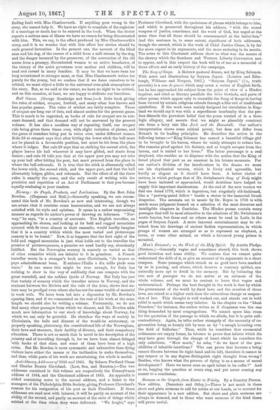good intention and some ability. We confess that we cannot
quite- understand the drift of it, or give an account of its arguments in a short compass. Some passages which struck us as good have been marked by us in passing, and others, which deserve a contrary epithet, are naturally more apt to dwell in the memory. But by balancing the
two sets of passages we do not arrive at an estimate of the- whole volume, and we must be content to leave that vague and undetermined. Perhaps the best thought in the work is that by which the government of the world by fixed laws and the creation of those laws, are raised to a higher rank than the miraculous change or suspen- sion of law. This thought is well worked out, and stands out in bold.
relief to much which seems very inferior. In the chapter on the "Ideal Preacher," for instance, the author writes as if eloquence was the one•
thing demanded by most congregations. We cannot spare him room for the quotation of the passage to which we allude, but it is quite self- contradictory. Again, he talks rather strangely of the necessity of re- generation being as keenly felt by man as by "a seraph hovering over the field of Solferino." Then, while he considers that ceremonial, ordinances are empty forms, ho labours to prove that infants which die may have gone through the change of heart which he considers the
only substitute.. "How much," he asks, " do we know of the pos- sibilities of infantile intuitions ? Who can prove that because a being-
cannot discern between its right hand and its left, therefore it cannot in
any respect or in any degree distinguish right thought from wrong ?' Besides, who knows what the process of dying is as a means of moral development ? Have we never seen an aged infant in its coffin ?" An& so on, begging the question at every step, and yet never coming any nearer to a conclusion.






























 Previous page
Previous page